
Sint-Pieters-Leeuw is a municipality in the province of Flemish Brabant, in the Flemish region of Belgium.

Lambic is a type of beer brewed in the Pajottenland region of Belgium southwest of Brussels since the 13th century. Types of lambic beer include gueuze, kriek lambic, and framboise. Lambic differs from most other beers in that it is fermented through exposure to wild yeasts and bacteria native to the Zenne valley, as opposed to exposure to carefully cultivated strains of brewer's yeast. This process gives the beer its distinctive flavour: dry, vinous, and cidery, often with a tart aftertaste.
The Pajottenland is a distinct region within the Flemish Brabant province and the south-western part of the Brussels Region of Belgium. The region is located west-southwest of Brussels. The Pajottenland is predominantly farmland, with occasional gently rolling hills, and lies mostly between the rivers Dender and Zenne / Senne. The area has historically provided food and drink for the citizens of Brussels, especially Lambic beers, which are only produced here and in the Zenne valley where Brussels is.
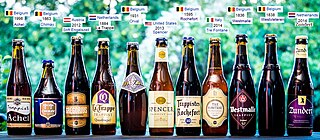
Trappist beer is brewed by Trappist monks. Thirteen Trappist monasteries—six in Belgium, two in the Netherlands, and one each in Austria, Italy, England, France, and Spain— produce beer, but the Authentic Trappist Product label is assigned by the International Trappist Association (ITA) to just ten breweries that meet their strict criteria. As of 2021, Achel is no longer recognized as a Trappist brewery because it does not have any monks.

The Senne or Zenne is a small river that flows through Brussels, Belgium. Its source is in the village of Naast near the municipality of Soignies. It is an indirect tributary of the Scheldt, through the Dyle and the Rupel. It joins the Dyle at Zennegat in Battel, north of the municipality of Mechelen, only a few hundred metres before the Dyle itself joins the Rupel.

Duvel Moortgat Brewery is a Flemish family-controlled brewery founded in 1871 in Antwerp Province, Belgium. Its strong golden pale ale, Duvel, is exported to more than forty countries. Duvel is Brabantian, Ghent and Antwerp dialect for devil, the standard Dutch word being duivel. Other popular beers include Maredsous and Vedett.
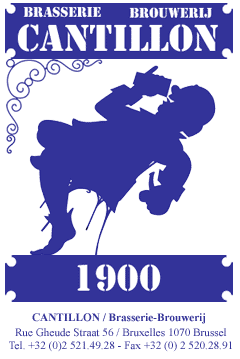
Brasserie-Brouwerij Cantillon is a small Belgian traditional family brewery based in Anderlecht, Brussels. Cantillon was founded in 1900 and exclusively brews lambic beers.

Belle-Vue Brewery is a brewery founded in 1913 in Molenbeek, Brussels by Philémon Vandenstock from nearby Itterbeek, which lies in a region known for its lambic type of beer. A variety of Belle-Vue lambic and fruit beers are produced in Sint-Pieters-Leeuw.

Beer in Belgium includes pale ales, lambics, Flemish red ales, sour brown ales, strong ales and stouts. In 2018, there were 304 breweries in Belgium, including international companies, such as AB InBev, and traditional breweries, such as Trappist monasteries. On average, Belgians drink 68 litres of beer each year, down from around 200 each year in 1900. Most beers are bought or served in bottles, rather than cans, and almost every beer has its own branded, sometimes uniquely shaped, glass. In 2016, UNESCO inscribed Belgian beer culture on their list of the intangible cultural heritage of humanity.

Brettanomyces bruxellensis is a yeast associated with the Senne valley near Brussels, Belgium. Despite its Latin species name, B. bruxellensis is found all over the globe. In the wild, it is often found on the skins of fruit.

Saison is a pale-colored ale that is highly carbonated, dry, fruity, spicy, and often bottle conditioned. It was historically brewed with low alcohol levels, but modern productions of the style have moderate to high levels of alcohol. Along with several other varieties, it is generally classified as a farmhouse ale.
The High Council for Artisanal Lambic Beers is a non-profit organisation that brings together the gueuze brewers and blenders of the Pajottenland and Zenne Valley in Belgium.
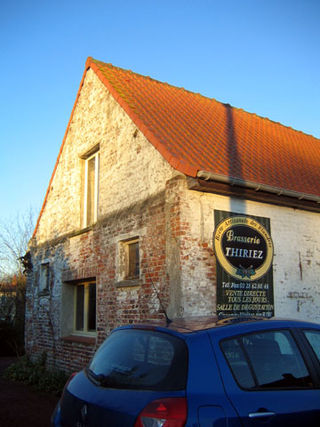
Brasserie Thiriez is a small craft brewery located in Esquelbecq, a town in the Arrondissement of Dunkirk in the Nord département, in the Hauts-de-France région of France, quite close to the Belgian border. It is situated on the grounds that formerly housed the Poitevin farm brewery, which was active and served the local area until 1945. The current brewery was founded in 1996 by Daniel Thiriez, who had become interested in homebrewing as a college student, and later left his career as a "human resources professional for a large supermarket chain" in the interest of reviving the tradition of the small village brewery. It exports beers in Europe, and the USA.
InBev was a brewing company that resulted from the merger between Belgium-based company Interbrew and Brazilian brewer AmBev which took place in 2004. It existed independently until the acquisition of Anheuser-Busch in 2008, which formed Anheuser-Busch InBev. InBev had operations in over 30 countries and sales in over 130 countries. In 2006, it had a market capitalization of €30.6 billion and net profit of €3.2 billion on sales of €13.3 billion.
Brasserie de Brunehaut is the trade name for Brunehaut brewery, located in Rongy-Brunehaut (Hainaut), Wallonia, 80 km south/southwest of Brussels, Belgium, near the French border.

Most beer sold in France is pilsner lager, mass-produced by major breweries which control over 90% of the market, although there are also traditional beer styles, such as top-fermented Bière de Garde, and a number of microbreweries.
Vlezenbeek is a small town of 3,324 in the Flemish Brabant southwest of Brussels, Belgium. It is part of the municipality Sint-Pieters-Leeuw. It is the home of Neuhaus, an international exporter of fine Belgian chocolate, as well as Lindemans Brewery, a brewery that produces lambics, a distinctly Belgian type of beer.
Vanberg & DeWulf was an American importation business that brought premium Belgian beer to the United States. Its portfolio was purchased by Total Beverage Solution.
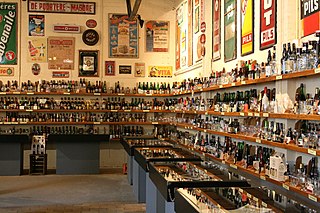
The Schaerbeek Beer Museum is a museum dedicated to Belgian beers in Schaerbeek, a municipality of Brussels, Belgium. The museum, which is a not-for-profit association, was founded in 1993 and officially opened in March 1994.
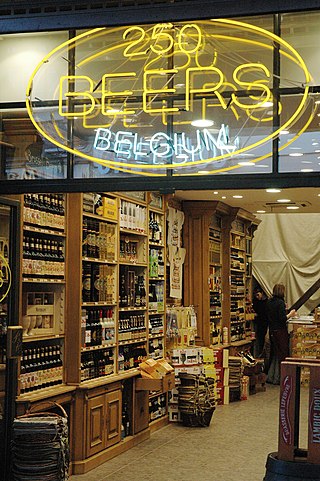
Belgian beer culture includes traditions of craftsmanship for brewing beer and is part of the diet and social life of Belgians. Its cultural value was formally recognised in 2016 when it was added to UNESCO's "Intangible Cultural Heritage of Humanity" list.

















